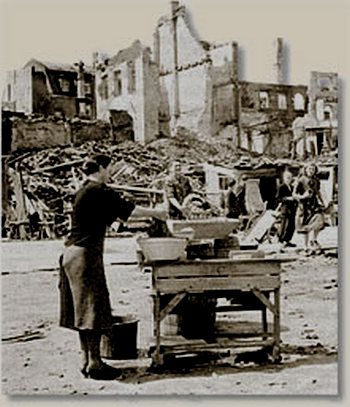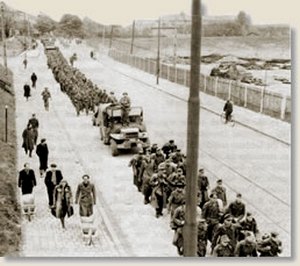A Defeated Germany
The war in Europe ended in May 7 1945, after thesigning of the act of unconditional surrender in Reims, France. Germany was in ruins. The majorityof its cities were destroyed practically to the ground and thetransport system was a mess. About 20 million Germans were left homeless and more than 5 million refugees were wandering around the country.
«White flags hung from the windows»
In the last days of the war, Charles Lindbergh was sent to Germany to collect information about the new German aircraft that the Luftwaffe had developed, such as the fighter jet and rocket-powered aircraft. He arrived in Germany a few days after its surrender and travelledaround in search of information. He kept a journal of observations, givingus some idea of the nation which had sought to conquer the world, but was crushed as a result of defeat in the war.
Friday May 18, 1945
In the villages, which we passed by on our way, white flags hung in the windows. We had seen the same thing in Munich. Once, we stopped a group of German soldiers to ask if we were going the rightway. They were in uniform but unarmed and apparently walked towards a house. Half a dozen young men, most polite, tried to tell us the most accurate route. No trace of hatred or hostility. Rather, they were like the sons of farmers.
It turned out that we were going in the wrong direction. I had to turn around. Passing by them, I dropped a pack of cigarettes. According to the instructions we were not allowed to make friends with the Germans. No fraternization. It was forbidden to shake hands, to serve food or give sweets to children.
A rocky winding mountain road leading to the headquarters of Hitler was filled with US military vehicles — jeeps and trucks. Soldiers, nurses and members of the Women’s Auxiliary Service of America were sitting there, bent on seeing the place where the Führer had lived and worked.
… Hitler’s headquarters, as well as the nearby building, had been heavily bombed and were now a ruin. Nearby slopes were dotted with craters from shells. The pine forest around the buildings still stood butwith peeled, destroyed trunks, mutilated crowns and splinterseverywhere …
We parked our Jeep near one of the buildings, and climbed up on the gravel, to the gaping doorway. A few yards above, I saw a German officer (who would have been in charge of a group of soldiers). Head down, he saluted the passing American officer. The American walked slowly, not paying any attention to the German. But he kept greeting him as he passed him. I will never forget the expressions on the faces of these two men.
Most of the building’s walls, which were built of stone, had stood firm. Inside, the floor was littered with rubble, some of the furniture had burned. From the wreckage and debris on the floor of the room, which was said to be Hitler’s office, we made our way to abig oblong hole in the wall. Here thereused to be a window with bulletproof glass. Hence it was possible to survey the Alpine mountain range in all its beauty -jagged cliffs covered with snow ,jagged mountain peaks against the blue sky, boulders, lighted sun andmountain valleys. It was one of the most beautiful mountain locations that I’ve ever seen.
… We returnedto the back room. Adead body only partially buried somewhere, gave off astench. We climbed up the stairs, strewn with fragments of concrete. The roof hadbeen demolished by the explosion and the stairway ended in the sky. Again we went downstairs to the kitchen, passingthe infantry with rifles on their shoulders. The floor was littered with warped kitchen appliances and broken plates and a furnace wascovered with rubble, which had fallen from the ceiling after the explosions.»
«In her eyes there was no hostility …»
«Approaching the Zell am See, we got to the territory still controlled by the German army. Officers and soldiers were still armed and regulated the traffic. The soldiers stared at us as we passed, but only stared. I did not see signs of hostility or friendliness on their faces. Every time we asked the way, they answered politely. There were two of us, driving in an American jeep passing the German army, as if there was no war.
Arriving in Zell am See, we stopped near the building, which was the local headquarters of the US Army. It was necessary to solve the problem of quartering for the night. We were told to spend the night in a house standing nearby, which used to be the house of a German doctor. His familyhadreceived a notice to leave their home only a few hours ago. After our army entered the occupied village, several houses werechosen that were suitable to accommodate soldiers. Residents were ordered to leave them. They were allowed to bring their clothes, some household items, but not furniture or beds. Where wouldthese people find food overnight? Such questions did not bother anyone. One of our officers told me that his soldiers had been throwing some unnecessary things out of the windows, which they found in the rooms occupied by them.
When I brought my bag to the entrance, I saw a young German woman taking out her possessions. We looked at each other and I did not see hostility in her eyes — only sadness and obedience. Behind her there were three children, two little girls and a little boy, all of them were less thanten years old. Furtively they looked at me with angerand were a little frightened as children who have been unjustly punished. Their hands were full of various children’s accessories and also lightweight things that they helped their motherto take out. »
These testimonies were taken from the books:
«The Wartime Journals of Charles A. Lindbergh» 1970
«The American army in the German occupation, 1944-1946», the author — Earl Zimka 1975
Translation into English by Karandeeva Anastasia and edited by Leona Thomas for










